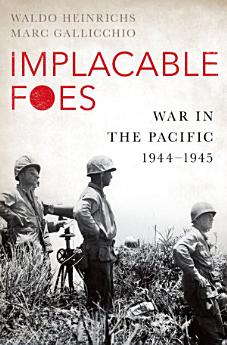Implacable Foes: War in the Pacific, 1944-1945
May 2017 · Oxford University Press
Ebook
640
Pages
family_home
Eligible
info
reportRatings and reviews aren’t verified Learn More
About this ebook
On May 8, 1945, Victory in Europe Day-shortened to "V.E. Day"-brought with it the demise of Nazi Germany. But for the Allies, the war was only half-won. Exhausted but exuberant American soldiers, ready to return home, were sent to join the fighting in the Pacific, which by the spring and summer of 1945 had turned into a gruelling campaign of bloody attrition against an enemy determined to fight to the last man. Germany had surrendered unconditionally. The Japanese would clearly make the conditions of victory extraordinarily high. In the United States, Americans clamored for their troops to come home and for a return to a peacetime economy. Politics intruded upon military policy while a new and untested president struggled to strategize among a military command that was often mired in rivalry. The task of defeating the Japanese seemed nearly unsurmountable, even while plans to invade the home islands were being drawn. Army Chief of Staff General George C. Marshall warned of the toll that "the agony of enduring battle" would likely take. General Douglas MacArthur clashed with Marshall and Admiral Nimitz over the most effective way to defeat the increasingly resilient Japanese combatants. In the midst of this division, the Army began a program of partial demobilization of troops in Europe, which depleted units at a time when they most needed experienced soldiers. In this context of military emergency, the fearsome projections of the human cost of invading the Japanese homeland, and weakening social and political will, victory was salvaged by means of a horrific new weapon. As one Army staff officer admitted, "The capitulation of Hirohito saved our necks." In Implacable Foes, award-winning historians Waldo Heinrichs (a veteran of both theatres of war in World War II) and Marc Gallicchio bring to life the final year of World War Two in the Pacific right up to the dropping of the atomic bombs over Hiroshima and Nagasaki, evoking not only Japanese policies of desperate defense, but the sometimes rancorous debates on the home front. They deliver a gripping and provocative narrative that challenges the decision-making of U.S. leaders and delineates the consequences of prioritizing the European front. The result is a masterly work of military history that evaluates the nearly insurmountable trials associated with waging global war and the sacrifices necessary to succeed.
About the author
Waldo Heinrichs is Dwight E. Stanford Professor Emeritus at San Diego State University. He is the author of American Ambassador: Joseph C. Grew and the Development of the United States Diplomatic Tradition, which won the Allan Nevins Prize. Marc Gallicchio is a Professor of History at Villanova University and was a Fulbright Visiting Lecturer in Japan, 1998 - 1999 and 2004 - 2005. He is the author of The African American Encounter with Japan and China: Black Internationalism in Asia, 1895 - 1945, which won the Society of Historians of American Foreign Relations Robert H. Ferrell book prize.
Rate this ebook
Tell us what you think.
Reading information
Smartphones and tablets
Install the Google Play Books app for Android and iPad/iPhone. It syncs automatically with your account and allows you to read online or offline wherever you are.
Laptops and computers
You can listen to audiobooks purchased on Google Play using your computer's web browser.
eReaders and other devices
To read on e-ink devices like Kobo eReaders, you'll need to download a file and transfer it to your device. Follow the detailed Help Center instructions to transfer the files to supported eReaders.





